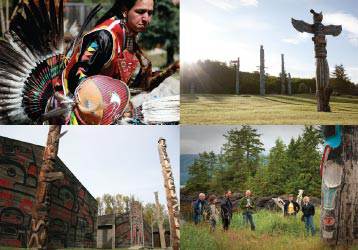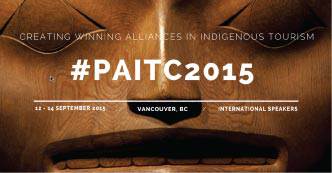Tracing back their history to thousands of years, British Columbia’s Aboriginal people – known collectively as First Nations, Inuit, and Métis peoples – enjoy a rich and deep culture that has stood the test of time. The vast lands of British Columbia are home to a people who managed to preserve their traditional way of life, still deeply imbibed in deep spirituality and defined by a strong connection to the wilderness and nature.

As British Columbia’s tourism industry sees an increasing number of visitors, the appeal of and demand for an authentic and different cultural experience has only grown more popular particularly among international travelers.
“It's not a true Canadian experience unless you have an authentic Aboriginal experience as part of your overall itinerary,” said Keith Henry, the president and CEO of Aboriginal Tourism Association of British Columbia (AtBC), a non-profit organization committed to promoting a sustainable and culturally faithful aboriginal tourism industry.
“We want to make sure that visitors from any country really understand the real story of Canada. Canada is thousands of years old. If you think of Egypt and their history, frankly we have similar history in Canada. We just haven't told our story,” added Henry.
This untold story, fuelled by a deep desire by the Aboriginal communities to share their heritage, is contained in the different efforts to immerse visitors into their culture and way of life.
“One of the unique things for the Aboriginal community here in British Columbia is that all our businesses are owned by our own people,” said Henry.
From authentic accommodations, outdoor adventures, and varying sorts of cultural centers, the province of British Columbia offers an unmatched diversity of options for all kinds of travellers, with nearly 75 percent of tourism and establishments related to Aboriginal tourism.
To illustrate this diversity, British Columbia has 203 Aboriginal communities made up of 200,000 Aboriginal people who speak approximately 40 different languages and dialects.
“We hear it all the time from people. People walk away from the experience with a different perception of life in general. It’s a life-changing experience,” said Henry.
“It's a win-win situation. It's one of the strongest economic drivers and culture revitalization in British Columbia that we have seen in years. It's a really great story,” he said.
In recent years, Asia has played a significant role in popularizing Aboriginal tourism.
With 10,000 visitors annually coming from the Asia-Pacific region, AtBC is looking to double that number within the next three years.
To meet that objective, AtBC will host the 2nd Pacific Asia Indigenous Tourism and Trade Conference between September 12 and 14 in Vancouver. The event will focus on the opportunities to promote and celebrate Indigenous tourism in the region. It will also allow participants, particularly from Asia, to gain a deeper understanding of how Aboriginal Tourism can enhance travel to Canada.
 “The Asia-Pacific Region is critical to us. It's really our number one priority,” Henry said.
“The Asia-Pacific Region is critical to us. It's really our number one priority,” Henry said.
As of this year, the province boasts of 80 "export-ready" Aboriginal experiences. Because of strong demand, AtBC is working with around 100 businesses wanting to increase their capacity to work with tour operators in Korea, Japan and China.
“We really want to work directly with the tour operators from all the countries in the Asia-Pacific,” Henry also said.
With its diverse product offerings and well-established infrastructure to accommodate travellers, British Columbia offers Asian visitors an extraordinary travel experience by taking part in the everyday lives of its aboriginal communities.
“This is the most authentic and unique experience you are going to have in Canada. We believe it’s unforgettable,” said Henry.









